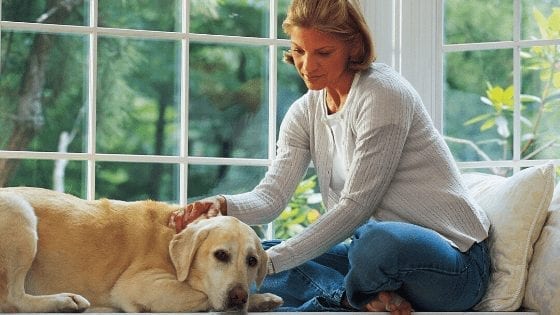Even in pet-loving homes, depression in dogs is relatively common. There are many reasons that your fur babies feel sad. They could be experiencing a loss of another pet, or they may be missing one of your family members who moved out. Some dogs are just more inclined to be unhappier compared to others.
Why does this happen, and what can you do to help?
Depression in Dogs: Puppy Blues
New puppies in the family are usually excited when they arrive, but some will feel a sense of loss and sadness. They will not show any interest in you or their surroundings.
Causes:
- They’re missing their mum and siblings
- Unfamiliarity with the surroundings
- Overwhelmed by the attention and the whole experience
Signs:
- Extremely quiet, not barking
- Just want to go to sleep and stay in a safe place
- Refusal to eat and drink
- Disinterest in playing
- Hiding from you
What To Do
- Get a full vet check-up to rule out any illnesses
- Try hand-feeding
- Give them lots of cuddles
- Make a warm bed or a safe area where they can retreat when they need to
- Encourage them to play with a toy or a moving rope
- Set a play date with other pups
- Give them attention and time
Depression in Dogs: Grown Fur Buddies
Even grown dogs who have been your companion for a long time can show symptoms of depression.
Causes:
- Death of another pet in the home
- Loss of a human companion
- A family member leaving the home
- Sudden change
- Moving to another house
- Pain caused by illnesses such as arthritis
- The arrival of a new pet or person in the home
- Your emotions: If you feel it, they may be picking up on your sadness
Signs:
- Extremely quiet, not barking
- Sleeping habits change
- Refusal to eat and drink
- Withdrawn from you and other people in the home
- Inactivity and lethargy
- Licking and chewing their feet and legs
- Excessive shedding of hair
What To Do
- Get a full vet check-up to rule out any illnesses
- Keep your daily routine and rules to give your dog a sense of security and comfort
- Relax and enjoy being with your dog
- Give them lots of petting and cuddles
- Praise and reward them every time they show a sign of happiness like a little tail wag
- As a last resort, your vet might be able to prescribe them medication
Depression in Dogs: Understanding Is Key
When depression in dogs occurs, it’s important not to feel rejected or resentful. Dealing with depression in dogs will take time. Show your fur babies, even more, love, affection, understanding and patience. Once their blues go away, they will go back to their usual self, playful, active and wanting a cuddle every time they see you.
Read more about taking care of your pets HERE.


